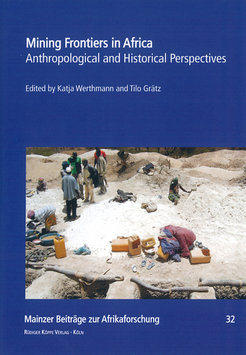Mining Frontiers in Africa: anthropological and historical perspectives

Author
Katja Werthmann, Tilo Grätz (eds.)
Publisher
Köln: Rüdiger Köppe Verlag
Year of publication
2012
ISBN
978-3-89645-832-2
OPAC
Abstract
When valuable minerals are discovered in areas in which government control is weak or contested, artisanal mining springs up and creates new communities, new forms of bonding and alliance, and new divisions and hostilities, or new forms of Integration and Conflict. Since the beginning of the 2000s there has been a boom in studies about non-industrial mining in Africa, but there is still a lot of work to be done, especially about the social worlds.
Mining and related economic activities can be profitable but also hazardous for individuals, communities and the natural environment. Whether artisanal mining can contribute to economic growth or be replaced by more sustainable livelihoods is a matter of on-going research. The regulation and enforcement of rights and obligations connected with artisanal mining vary from state to state. It is is often seen as a response to poverty, but mining is ancient in several regions of Africa, and we need to understand continuities as well as changes in order to make sense of present-day mining activities. Life in mining camps is also attractive because it empowers social uniors and offers access to alternative life-styles. The motives for taking up mining vary according to the historical, social and political circumstances as well as according to an individual’s age, gender and social status.
The cases presented in this volume show studies of historical and present-day mining in Africa that focus on the social organization of mining and related livelihoods, on different actors involved in mining, and on social changes brought about by mining booms. It ranges from pre-colonial mining to the present-day industrial mining boom and presents cases from Angola, Benin, Burkina Faso, Ghana, and Sierra Leone.
